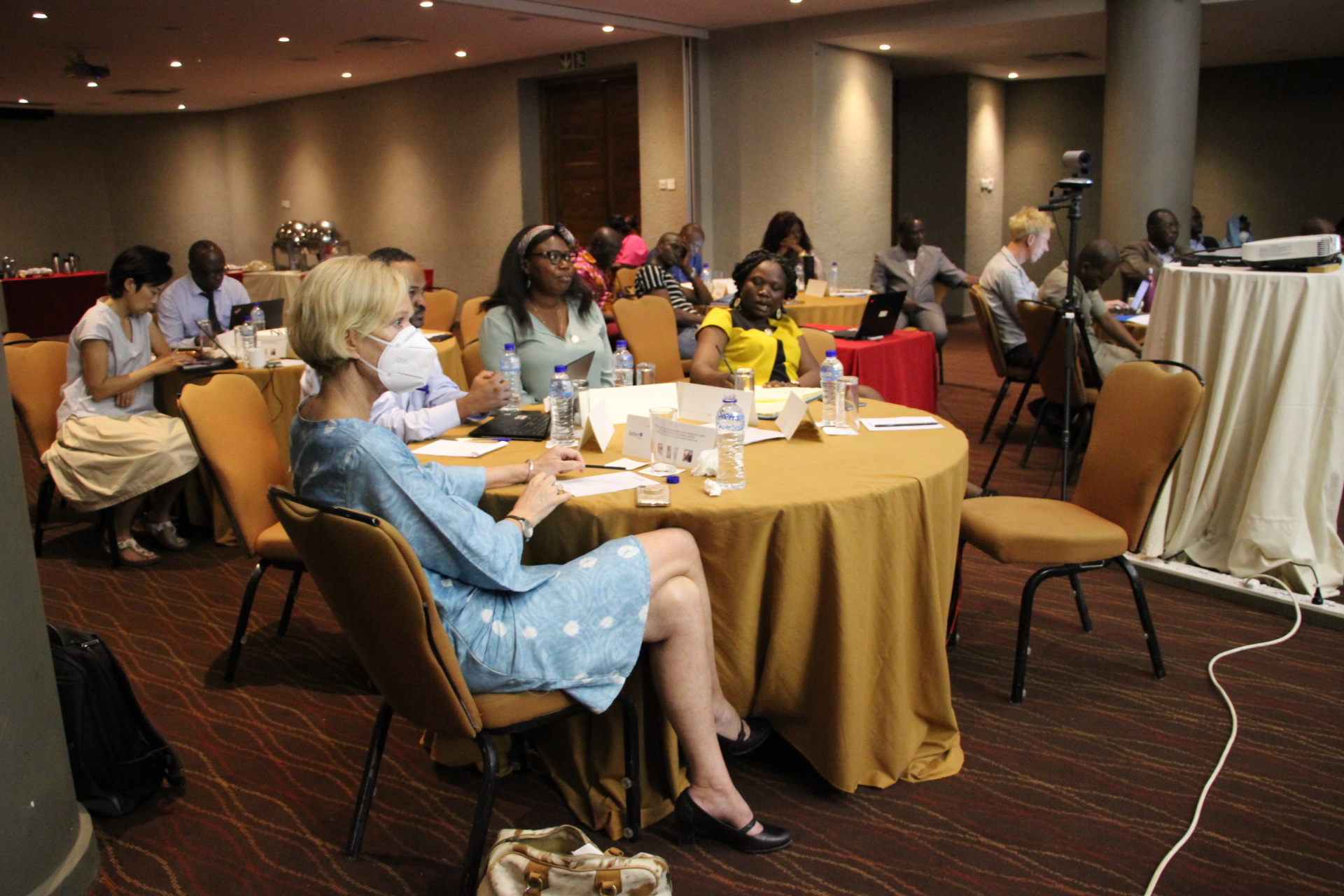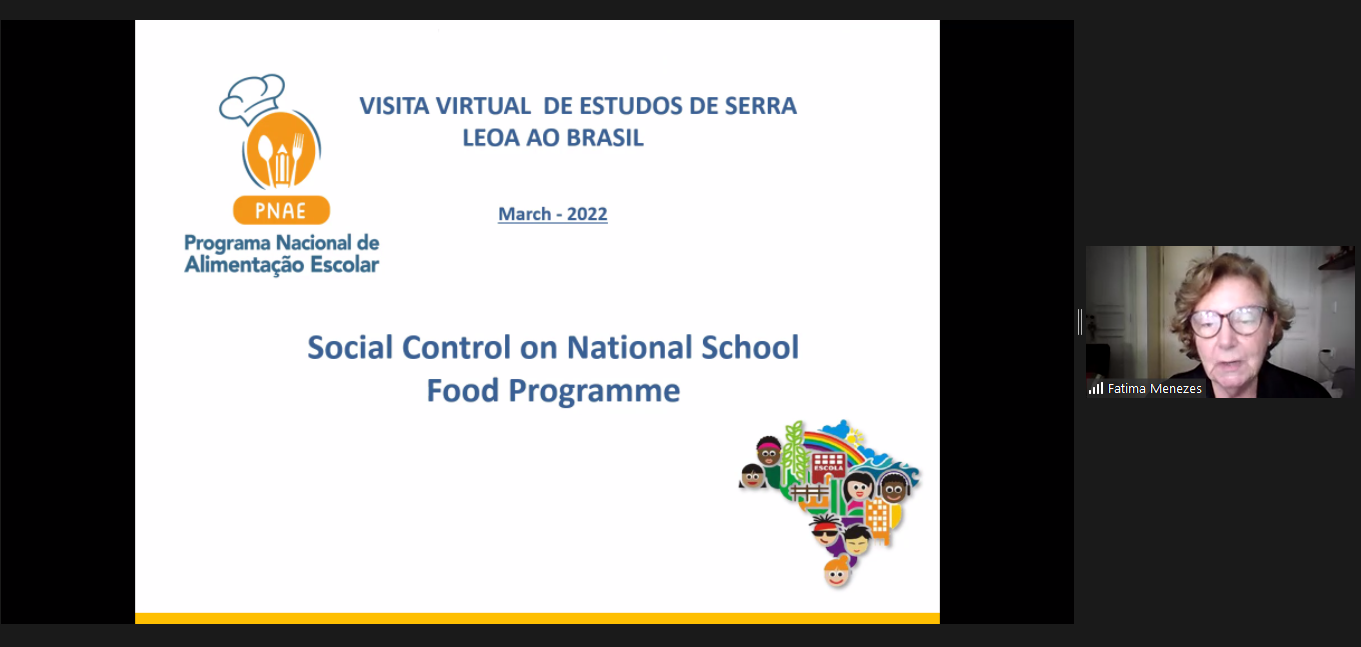
The government of Sierra Leone took part in the “Virtual Study Visit: Brazil” on Tuesday, March 29. Around 37 participants from various home-grown school feeding implementing sectors and Non-Governmental Organisations gathered in person in Freetown, while WFP staff and government district officers, as well as experts from Brazil and Sierra Leone, joined online. The aim of this South-South Cooperation initiative involving Brazil and Sierra Leone is to share the countries’ experiences in home-grown school feeding to strengthen the model currently in place in Sierra Leone and prepare it for scale-up. The “Virtual Study Visit: Brazil” is a joint initiative by the WFP Centre of Excellence against Hunger Brazil, the Brazilian Cooperation Agency (ABC) and the National Fund for Education Development (FNDE) which aims to showcase the successful Brazilian experience of its National School Feeding Programme (PNAE) to cooperating countries.
The government of Sierra Leone is currently implementing a National School Feeding Programme in 14 districts. In collaboration with the Japan International Cooperation Agency (JICA), the WFP country office and the School Feeding Secretariat are piloting home-grown school feeding in 17 schools in two districts, providing the schools with cash to purchase locally-grown fresh vegetables from farmers located within the school communities. During the Visit’s opening panel, Yvonne Forsen, Deputy Country Director of WFP Sierra Leone, spoke about the benefits of the home-grown component within school meals programmes and congratulated the local government for the effort of integrating local agriculture. “Home-grown school feeding improves children’s nutrition, which is necessary to ensure physical and cognitive wellbeing. Home-grown school feeding is at its birth in Sierra Leone and we have a lot to learn from Brazil”, she said.
Daniel Balaban, Director of the WFP Centre of Excellence against Hunger Brazil, detailed the role of the Centre of Excellence in fostering South-South Cooperation, and the products and services offered, including the Virtual Visit. “We use a set of tools to facilitate South-South dialogues, including this Virtual Visit, which is based on the Brazilian school feeding model. So I would like to thank you for this opportunity and to congratulate the government of Brazil for the cooperation and the government of Sierra Leone for their determination to make their school feeding programme even stronger”, he said. Other authorities present at the event included representatives from the governments of Brazil and Sierra Leone, such as the Ministries of Agriculture, Education and other technical bodies.
School Feeding in Sierra Leone
In a context of poverty, food insecurity, and malnutrition, school feeding has been an important safety net in Sierra Leone since independence, ensuring that many children can participate in primary education and receive a daily minimum healthy diet. To prioritize the enhancement of educational outcomes, in 2018 the Government of Sierra Leone launched its flagship “Free Quality School Education Initiative”. In the context of this initiative, in May 2021, Sierra Leone launched its National School Feeding policy.
WFP is the government’s leading partner in school feeding, providing daily hot meals to to 216,236 children in 970 pre-primary and primary schools across five districts (Bonthe, Karene, Kenema, Pujehun and Kambia). The School Feeding Policy endorsed in 2021 recommends a shift toward the home-grown model and the WFP Centre of Excellence in Brazil is currently working closely with the WFP country office to facilitate exchanges with the Brazilian school feeding programme, which could potentially inspire several aspects of the pilot.
Mamusu Massaquoi, Deputy Minister of Basic and Senior Secondary Education in Sierra Leone, detailed the current status of the provision of school meals in the country, which is currently present in 14 of 16 districts covering over 640,000 students (45% of the total), in collaboration with other partners such as WFP, CRS, Plan International and Caritas Bo. “The vision is to have a decentralised and sustainable home-grown school feeding programme to enhance health and nutrition, linked to local agriculture”, she said. Alex Fissan, District Agriculture Officer in Pujehun, talked about how WFP has been assisting Sierra Leone farmers with the creation of market flows, increasing capacity and other activities to improve yearly income for farmers and food production for school meals, which is part of the necessary development pathway for the home-grown school feeding programme pilot.

Virtual Study Visit: Brazil
The Virtual Study Visit methodology was built on the Brazilian experience acquired with the National School Feeding Programme (PNAE), which the WFP Centre of Excellence has been sharing with other countries over the last ten years, in partnership with the National Education Development Fund (FNDE) and the Brazilian Cooperation Agency (ABC). The session included technical presentations on programme design and implementation; technical assistance to smallholder farmers; nutrition-sensitive initiatives; and community participation.
Participants watched several videos describing the details of the Brazilian experience, which were combined with presentations and Q&A sessions. Karine Santos, Coordinator of the Brazilian National School Feeding Programme, gave an overview of the programme and its 67 years of history, highlighting the link with local agriculture, which is one of the main aspects of the cooperation efforts taking place between Brazil and Sierra Leone. Loiselene Carvalho Trindade, Director of the Brazilian Institute for Technical Assistance and Rural Extension (EMATER), highlighted the importance of technical assistance in the connection between the education and agriculture sectors for the implementation of home-grown school feeding programmes. EMATER helps organize farmers to guarantee that local products will reach local schools, observing quantity, quality and seasonality parameters.
Nutrition-sensitive components were also highlighted in the session, especially in a presentation shared by Sineide Santos, PNAE’s Nutritionist and Coordination assistant. She detailed specific nutrition requirements within the Brazilian school feeding programme, such as limits to the use of processed foods, the creation of menus that respect local culture and agriculture production, and the advantages of having a nutritionist working within the school to guide the whole process.
In the last section, participants heard from Fátima Menezes, Social Control Coordination at the National Fund for the Development of Education (FNDE), who spoke about the details of school feeding councils. These councils are composed of elected members who oversee all activities within the programme.
The Virtual Visit is part of broader support being provided by the WFP Centre of Excellence to the Sierra Leone country office, in an effort to enhance and scale-up their home-grown school feeding pilot.
Learn more about the “Virtual Study Visit: Brazil” and request a virtual visit here.




